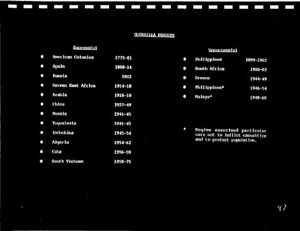Patterns of Conflict
| The works of |
| Works of John Boyd |
|---|
OODA WIKI Edition
Quantico Transcription
So guerrilla results, and this is a very truncated list I’ve put because there’s so goddamn many of them. Start with the American Colonies. Here we fought the red coats. Down here we became the red coats [unintelligible]. See here we fought the red coats. Here we became the red coats.
Okay. Here are the Philippines. Now that’s another operation that should’ve been studied. We started out badly there. We finally figured out the right thing to do, and we were quite successful.
There’s some good lessons in there. But that happened at the turn of the century. Screw it. It’s not important.
South Africa, in a sense I should’ve probably put that over on this side. Christ, they caused the British all kinds of problems. Not only that, the only way the British could get them to quit is they gave them very favorable terms. Not only that, later on the South Afs got their independence anyway. So in a sense, they were successful, even though they signed the armistice.
Greece in ’44, ’45. Philippines, this is won by Magsaysay. He came on board and in two years reversed almost a certain defeat into absolute victory. And we had all that information available to us going into Vietnam. See, but he understood how to fight the guerrillas. Remember, he was a guerrilla himself initially. So now he became a guerrilla working for the government. So he turned the tables on them.
Wyly: You know, you really see the same thing in Malaya too. It’s misleading. You see all those years there, but it’s actually one in the last three or four years. Briggs[1] took over and they turned the tables.
Boyd: When Briggs finally got there they started turning it around, yeah. Finally they get their act together. Well, yeah, I showed a lot of years here too, ’46 to ’54. But it only lasted a couple years.
[Cross talk]
Boyd: Same thing. They finally figured out, hey, there’s a way of doing this thing.
Audience: The key for the example of Malaya would be Thailand, was in Southeast Asia, that’s the only country the communists completely failed—
Boyd: Say again?
Audience: Thailand, that’s the only country the communists failed completely in the last 30 or 40 years [unintelligible].
Boyd: Couldn’t pull it off. Couldn’t pull it off.
Audience: Malaysia they were quite successful initially.
Boyd: Initially. But then they were—
Audience: [unintelligible].
Boyd: Yeah, now what’s happened— see, not only that, the Philippines, Magsaysay turned it all around, but now they’ve let it all goddamn fester all over again. Now we’ve got big problems over there again. [35:00] So it’s not clear. They still may take over. You know, they blew it. See Marcos and his guys doing the heavy handed stuff, so now it’s all started all over again.
And interestingly enough, you should read the— there’s an essay, as a matter of fact, in Guerrilla Strategies, about from the communist side over there, how they lost the Philippines. The whole thing’s coming apart. They don’t know where to go. Boy, they’re being scarfed up so fast by the government. But they don’t know where to go because the government’s getting the villages on their side, see. So now they’re the ones that are being on the run and don’t know where to go. It’s an interesting story by one of the losers.
Lightfoot Transcription
- ↑ 39 Sir Harold Rawdon Briggs developed a counterinsurgency plan that bore his name as part of the British effort to defeat communist insurgents in Malaya during the Malayan Emergency of the 1950s.
